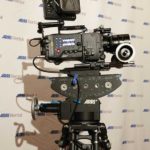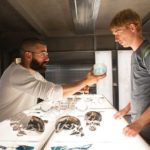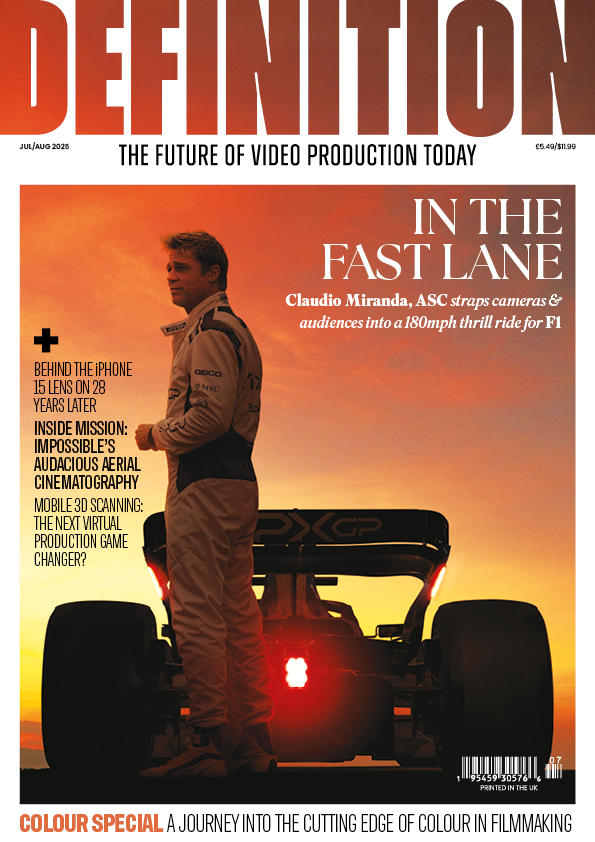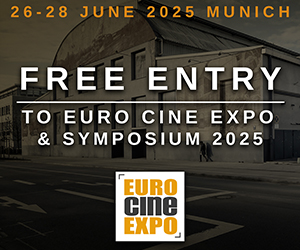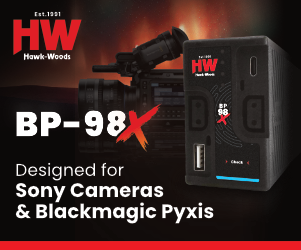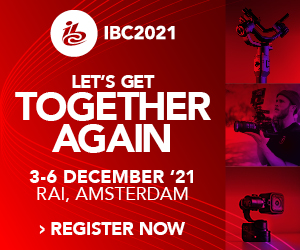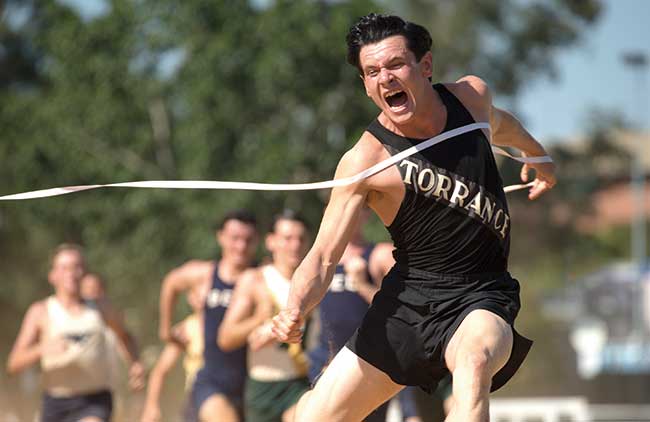
The Golden Hour
Posted on Feb 11, 2015 by Alex Fice
Oscar winning and Oscar nominee William Goldenberg has his pick of movies to edit including recently The Imitation Game. He talks about his methodology.
What drew you to the film?
“Initially it was the screenplay, I read a lot of scripts and that one leaped out. A few people called me about it and told me that it was really fantastic. I wasn’t available at first as I was committed to do another film which ultimately fell through. I found out that Benedict was going to be starring in it and I thought he would be just perfect, I couldn’t imagine anyone else playing him. So the combination of both really drew me to it. Also when I met Morten Tyldum, (the director) and I really like what he had to say as to what he was going to do with the film. I think that everyone who was on the film felt the same way, that it was a story that really needed to be told – everyone felt really passionate about it. “
When you read a screenplay do you start to edit the film in your head?
“Yes somewhat, it depends on the scene. If I know who the actors are I certainly can picture the actors. If not I will picture who I think could do the job if it hasn’t been cast. For certain scenes I would start thinking about the editing possibilities especially if I had talked with Morton and I understood the style he was going to shoot it which was pretty classic style. “I think what the challenges are going to be and also what would be fun editorially.”
What do you think that you bring to a project like this?
“I think I bring the fact that I’m a good storyteller. Ultimately that’s the job of the editor, to tell a good story and to make sure that the story is focussed. But in terms of this film because a lot of the war part of it is a race against the clock, them trying to break the Enigma code before more people die, I did try to induce a certain amount of pace in those scenes. But still allowing Benedict’s performance to breathe as well as the other actors. You can accomplish both and I tried to have an underlying tension, an underlying sense of pace. In the film every day the Germans changed the settings on the Enigma machine and that meant that every night at Midnight all their work for that day was basically a waste. So there is this constant sense of hurrying up and then at Midnight a sense of failure. There is a lot of failing in this movie, they only get it right the one time!”
 William Goldenberg, already an Oscar winning feature film editor.
William Goldenberg, already an Oscar winning feature film editor.
“Is it harder to create tension when the conclusion of the story is well known?
“I’ve had several films in a row like that. Argo was the same way as was Zero Dark Thirty. You try and create a sense of tension and then as a story teller you try and get the audience so wrapped up in the film that they forget they know the ending. That’s more something I can just feel, whether it’s working or not, there’s no recipe for it. You’re making the film as if they didn’t know. You’re making it as gripping as possible and hopefully you’re holding on to your audience in such a tight way that they are emotionally involved and not thinking about what comes next.”
Some of the scenes with the code breakers are more like theatre ensemble pieces, what was the thinking there?
“Morton shot it in a classical style. You do try to do little things and touches to make seem a little bit more cinematic. It can be subtle or be a grand gesture but I try and do things editorial that are telling the story in a really interesting way but doing in, even the smallest thing, in a fresh way. When I worked with Michael Mann I would say ‘If we just cut from here to here it would work beautifully.’ He would say ‘That would be easy!’. So I always have that in my mind to do something that is overtly different but to make it feel slightly different. Cutting in an unexpected place or playing something in a way off-camera that might feel unsettling. Something that will make it feel a little bit different but at the same time unnoticed by the audience.”
A lot of the post on the movie was done in London. Was that practical for you?
“I was Stateside except for the mix and the score. The VFX were also done in London. We were teleconferencing which works quite well, we had a common computer screen along with a screen that we could each draw on to illustrate what we were trying to do and the changes we wanted to make. When we went to do the mix, Morton was there for the entirety of the final mix, I was actually there for the last five days as I had already started on another movie.”
Is it usual for you to attend the sound mix?
“Yes I always do. The Imitation Game was a fairly low budget movie so when they were preparing for the mix I went off and did another film. I was then able to come back for the final mix. I’m sort of supervising the mix in terms of making sure all the elements are there. At that point I know the film better than anybody. There is a lot of sound editing to be done and mistakes are made. Things don’t sound the same, there maybe was a different microphone from the one I used. A lot of what I do is to make sure that the film we turned over is the film that we are going to get at the end.”
At that point is your Edit locked?
“With The Imitation Game it was. It used to be that it always was and now more often than not there are changes to be done while you’re mixing. That’s just the nature of things now because of shorter schedules and a lot of times on bigger budget movies there are previews during the final mix that are made and the sound editors have to catch up and conform things to match what we’ve done. It happened even on film to a certain extent but it’s more than schedules get jammed up at the end.”
Is there any difference for you dealing with a movie that is shot on film or digitally?
“By the time the film gets in to the AVID for me it doesn’t really affect anything I do creatively. The only things it does affect is the amount of material you get. The Imitation Game was shot on film but when you shoot digitally you get more material. In a film magazine you get about 10 minutes and with digital you can shoot about 45 minutes without stopping the camera. So there is a tendency to let it run.”
 A still from Unbroken shot by Roger Deakins on the Arri ALEXA and cut by William Goldenberg. He commented: ‘My preference is film but this movie is gorgeous’.
A still from Unbroken shot by Roger Deakins on the Arri ALEXA and cut by William Goldenberg. He commented: ‘My preference is film but this movie is gorgeous’.
Do you prefer more footage than less?
“Well yes I do. More footage gives you more options. When you have less footage you tend to say ‘If I only had this shot or that shot. If I need to shorten the scene and I had something here I could use it as an escape hatch to get out of the scene or get in to a scene late.’ When there’s less footage sometimes you don’t have that opportunity. You always find a way to make it work but I like a lot of coverage, it affords more possibilities. Luckily enough with Morton he’d have a lot of film, not overwhelming. But he is such an efficient director he was able to get ‘good’ film. The movies was only an eight week shoot, very short, and he was able to get a very complex script done very efficiently.”
What does the latest AVID system give to you?
“You can do everything in AVID. I did do a couple of movies a while ago on LightWorks. I’ve been an AVID user since 1995 or 1996, whenever The Insider was it was my first film on AVID. Whoever layed it out or designed it made very user friendly. At this point I’ve been using it as a kind of extension of my hand and my mind. I no longer have to look at the keyboard or the buttons. Part of that is doing things over and over but. It allows me to be wrong over and over again without destroying the film. I can try endless things and things that I might not normally try. It also allows a much better presentation in terms of sound and VFX and colour timing – you can do all that in the AVID to a great degree.
“When you’re showing the film to people especially early on, it makes them feel like they’re actually watching a movie. They can lose themselves in it as all the technical imperfections can be got rid or and make it sounds really nice and look really nice. Consequently the expectations are greater because now people come to expect that but it’s a new part of the job that’s really fun for me – you need to put something out there that sounds and looks great.
“Now we’re cutting in real good quality HD you can actually take it right out of the AVID and preview and that’s a huge time saver.
Do you push the sound, VFX and colourists to get something as soon as possible?
“Well I’m doing a movie now that is about concussions in the NFL so there is a lot of football in it so. It’s similar in a way to Zero Dark Thirty where the Navy Seals were a huge part of it, whatever it is, maybe a boxing movie. I’ll ask the sound editors for a library of material to start working with and go back and forth with them and along the way keep gathering stuff that they produce so I’m using their material. So you get a rough blueprint of what the sound is going to be. In to a version that can be played in a large theatre. It’ll sound good in my editing room but when we take it to a much larger theatre it doesn’t fill the room so much. But hopefully the material will be sourced from the sound editors and designers. So it’s a constant back and forth with that.
You’re massively experienced at editing but could you ever see yourself as a director?
“I am exploring that possibility and I have some representation in that area. I love editing so much that it would have to be something that I am incredibly passionate about. It’s such a fun time in my career right now that it’s hard for me to step away and become a Director. It’s not like I’m unhappy with my career and I have to try something else, I love my career. But at the same time I am intrigued by the idea of Directing a film so it’s a bit of a weird situation trying to find the time to explore and develop projects while I’m working constantly.
“I do have a couple of things right now that I’m developing but it’s really hard to find the time while my mind is fully focussed on cutting.
“I was fortunate to train under really talented editors so I think I know the difference between what’s good and what’s not good at this point. I trained under Michael Kahn who is Steven Spielberg’s editor, I was his assistant for four years. I like to refer to that as my graduate school. I saw how difficult it was to become a feature film editor without someone’s backing, without someone mentoring me. It was the single smartest thing I’ve ever done. He taught me an incredible amount about everything, his methodology, how to manage a workflow in terms of not being overwhelmed by large amounts of footage, how to deal with politics, how to deal with taking criticisms – the list goes on and on.
“I saw how difficult it was to come up by cutting small independent films and to hope that one of them will ‘hit’. So I was able to work on bigger films with Michael and I was able to step across from assisting to editing at a little bit of a higher level than I would have done had I tried to do it on my own.“











